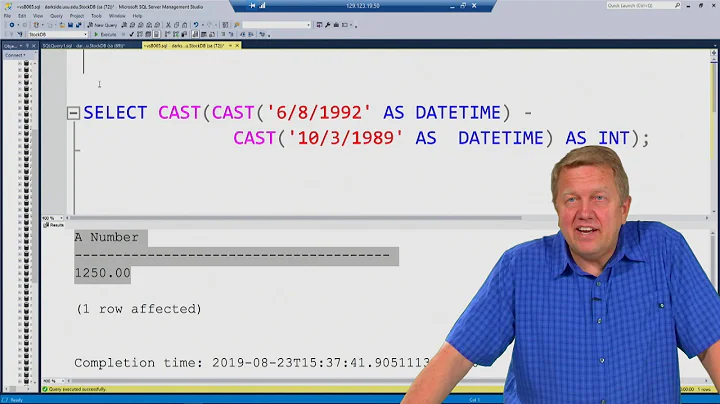SQL Server function to return minimum date (January 1, 1753)
Solution 1
You could write a User Defined Function that returns the min date value like this:
select cast(-53690 as datetime)
Then use that function in your scripts, and if you ever need to change it, there is only one place to do that.
Alternately, you could use this query if you prefer it for better readability:
select cast('1753-1-1' as datetime)
Example Function
create function dbo.DateTimeMinValue()
returns datetime as
begin
return (select cast(-53690 as datetime))
end
Usage
select dbo.DateTimeMinValue() as DateTimeMinValue
DateTimeMinValue
-----------------------
1753-01-01 00:00:00.000
Solution 2
Have you seen the SqlDateTime object? use SqlDateTime.MinValue to get your minimum date (Jan 1 1753).
Solution 3
As I can not comment on the accepted answer due to insufficeint reputation points my comment comes as a reply.
using the select cast('1753-1-1' as datetime) is due to fail if run on a database with regional settings not accepting a datestring of YYYY-MM-DD format.
Instead use the select cast(-53690 as datetime) or a Convert with specified datetime format.
Solution 4
Enter the date as a native value 'yyyymmdd' to avoid regional issues:
select cast('17530101' as datetime)
Yes, it would be great if TSQL had MinDate() = '00010101', but no such luck.
Solution 5
Here is a fast and highly readable way to get the min date value
Note: This is a Deterministic Function, so to improve performance further we might as well apply WITH SCHEMABINDING to the return value.
Create a function
CREATE FUNCTION MinDate()
RETURNS DATETIME WITH SCHEMABINDING
AS
BEGIN
RETURN CONVERT(DATETIME, -53690)
END
Call the function
dbo.MinDate()
Example 1
PRINT dbo.MinDate()
Example 2
PRINT 'The minimimum date allowed in an SQL database is ' + CONVERT(VARCHAR(MAX), dbo.MinDate())
Example 3
SELECT * FROM Table WHERE DateValue > dbo.MinDate()
Example 4
SELECT dbo.MinDate() AS MinDate
Example 5
DECLARE @MinDate AS DATETIME = dbo.MinDate()
SELECT @MinDate AS MinDate
Related videos on Youtube
Jeremy
Updated on February 26, 2022Comments
-
Jeremy about 2 years
I am looking for a SQL Server function to return the minimum value for datetime, namely January 1, 1753. I'd rather not hardcode that date value into my script.
Does anything like that exist? (For comparison, in C#, I could just do
DateTime.MinValue)Or would I have to write this myself?I am using Microsoft SQL Server 2008 Express.
-
Joe Stefanelli over 13 yearsJust curious: Why are you planning to use that date at all as opposed to letting the column be NULL instead?
-
Gabe over 13 yearsYou could use
CONVERT(smalldatetime, 0)forsmalldatetime. -
 Gennady Vanin Геннадий Ванин over 13 yearsCONVERT(smalldatetime, 0) or CONVERT(datetime, 0) or cast(0 as datetime) is not minimum value of datetime
Gennady Vanin Геннадий Ванин over 13 yearsCONVERT(smalldatetime, 0) or CONVERT(datetime, 0) or cast(0 as datetime) is not minimum value of datetime -
Jeremy over 13 years@Joe: The column does not allow NULL values, and I don't want to change it since I am not creating this table.
-
-
Jeremy over 13 yearsThis needs to be a SQL function, not a .NET function.
-
Jeremy over 13 yearsI was hoping to avoid writing my own, but it looks like that is my only option.
-
Gabe over 13 yearsIf you're going to have an arbitrary constant,
'1753-1-1'is much better than-53690 -
Jeremy over 13 years@Gabe: Yes, I was thinking the same thing. Coming back to the script, I would have no idea what -53690 means.
-
Jeremy over 13 yearsThat is true, but it would still be nice to call GetMinDate() or something like that instead of CONVERT(datetime, '1753-1-1') wherever I needed to use it.
-
D'Arcy Rittich over 13 yearsThe function name would make obvious the meaning of the value.
-
Andomar over 13 years@Jeremy: I know what
convertdoes, but forGetMinDate()I'd have to dive into the function definition. So if I had to maintain your code, I'd prefer theconvertvariant. -
Evan about 11 yearsAlthough SqlDateTime.MinValue is useful, it's deceptive to have this as an answer. @Jeremy is asking for a native sql function, not something from .NET's class library
-
 jwg over 10 yearsYou might know what
jwg over 10 yearsYou might know whatconvertdoes, but you wouldn't necessarily know the significance of1753-1-1. -
Ram about 10 yearsThere is no function even in SQL Server 2012 to get min date similar to getdate() hence the above one is the only possible solution. This is for anyone who is looking for better solution in sql server 2012 related solution.
-
t_plusplus about 10 yearsplus one for this helped with a similar question but in a .Net context not SQL; as it is the case with this question..
-
 Kapé over 8 yearsMaybe you can actually achieve this by using the new U-SQL
Kapé over 8 yearsMaybe you can actually achieve this by using the new U-SQL -
 Triynko about 8 yearsJust use DateTime2(7). It maps to the .NET DateTime type exactly. Using sql 'datetime' is a bad as using 'varchar' instead of 'nvarchar'. 'nvarchar' aligns with .NET String type. Same idea. Then you can just use DateTime.MinValue everywhere.
Triynko about 8 yearsJust use DateTime2(7). It maps to the .NET DateTime type exactly. Using sql 'datetime' is a bad as using 'varchar' instead of 'nvarchar'. 'nvarchar' aligns with .NET String type. Same idea. Then you can just use DateTime.MinValue everywhere. -
 Crono about 8 years@Gabe using the -53690 value will make the code agnostic on regional settings though.
Crono about 8 years@Gabe using the -53690 value will make the code agnostic on regional settings though. -
Jim over 7 yearsAs mentioned by Frank Gillich below,
cast('17530101' as datetime)will also avoid the regional issues and is slightly more readable than -53690. -
BobHy over 6 yearsOP wanted to avoid hard-coding a constant in his script. This proposed answer still has a hard-coded constant. It might not have to be embedded in each script, but would have to be embedded in some user-written script.
-
BobHy over 6 years@RedFilter - Agreed, this is a stupid incompleteness in SQL Server API, but your answer does not avoid the constraint imposed by OP, simply moves the workaround to another place in his/her script. Consequently, not a totally acceptable answer.
-
 Cee McSharpface over 6 yearsjust to have this linked, related (max): stackoverflow.com/a/548373/1132334
Cee McSharpface over 6 yearsjust to have this linked, related (max): stackoverflow.com/a/548373/1132334 -
bugybunny over 5 yearsThis is not correct. The base datetime is 1 Jan 1900 00:00:00.000 (what you get with
SELECT CONVERT(DATETIME, 0)) but the actual minimum value that datetime can hold in SQL Server is actually in 1753 what OP wrote. That‘s when America also switched to the Gregorian calender and SQL Server doesn‘t have to deal with missing days etc.SELECT CONVERT(DATETIME, -53690)gives1753-01-01 00:00:00.000andSELECT CONVERT(DATETIME, -53691)gives an error about an overflow. -
ToolmakerSteve almost 3 yearsNOTE: stackoverflow.com/a/39541331/199364 says that
cast('17530101'avoids regional issues, so use that instead ofcast('1753-1-1'. -
ToolmakerSteve almost 3 yearsI strongly disagree with the objection to having to dive into the function. Its ALWAYS more maintainable to NAME special values. "Magic Numbers" are bad for maintainability. Another downside of hardcoding it everywhere you need it, is the possibility of a typo. Suppose you accidentally type `CONVERT(datetime, '17540101') once. Would be easy to overlook, and might work for most purposes. But someday cause misbehavior by code that is checking for '17530101'. A lurking bug.












